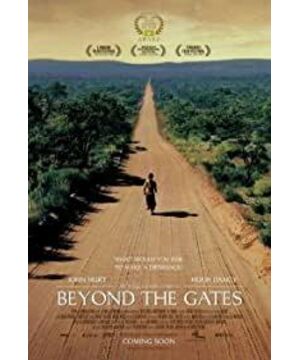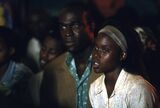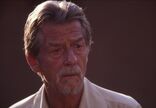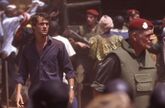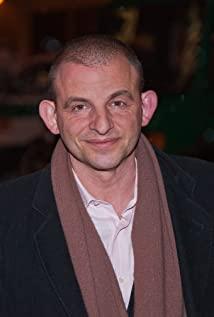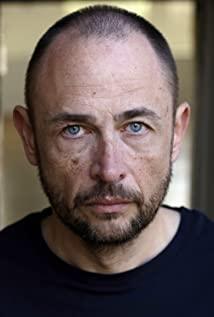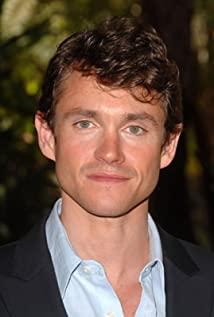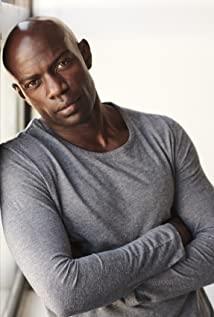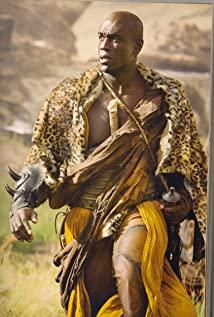Audiences who have watched the film "Rwanda Hotel" that truly reflect the 1994 "Rwandan Genocide" from the perspective of a Rwandan person may have watched this "Killing Forbidden Zone" , The perception will not be that strong, or perhaps the latter’s narrative techniques, overall presentation, and depth of profiling are not as proficient, professional and profound as the former, and even some shooting techniques may be clumsy, but it is undeniable Yes, it also has a frank heart that reflects the truth of the incident.
I have watched the film for a long time and haven't written anything for it. It was probably because the pain was too deep for the "restaurant" at the time, and the film "Killing" itself does have problems. In addition, when faced with Joe Kona, a teacher of Lu English who is played by Hugh Dancy, a literary love student, he always felt that his expressiveness was not enough. However, the performance of the old guy John Hutt played a certain role. He played the role. Father Christopher’s behavior is as broad as his heart. The hope for peace in exchange for love is so fragile and lonely under the guns and knives blinded by hatred and irrational, but it is admirable. Its prototype is the pastor Vijank Kurik, who was one of two non-African priests who voluntarily stayed with the Rwandan fate during the massacre.
Today, on the 15th anniversary of that tragic massacre (April 6, 1994, the Hutu president of Rwanda was killed in a plane crash. On April 7, a planned and organized killing began, and the following three Rwanda is like a hell on earth for a few months), and it seems necessary to say a few words of justice for this film that the critics think “just want to take a ride on the African theme”.
"Variety" criticized the film for choosing the wrong perspective, "You should not use white eyes to tell the story." Naturally, it is more effective to tell from the perspective of the Hutu or Tutsi people during the massacre in the country. , But the film’s main creator obviously wants to reproduce the tragedy with another mentality and feeling, which is a bit similar to a news feature. They confessed this painful historical fact from a white perspective, and there seems to be a feeling of guilt in it.
At least it is well known that in the unfortunate history of Rwanda, the Belgians deliberately used the method of wooing one clan to suppress one clan during the colonial rule, which intensified the ethnic conflict in Rwanda. At the beginning of the bloody massacre in 1994, the US and British governments lobbied the UN Security Council not to send troops to Rwanda, and even within one month after the massacre began, they refused to admit that it was a "planned genocide." In the past three months, Rwanda’s blood flowed into rivers, and nearly 1 million people died on the streets.
The reason for the abandonment of Rwanda, as explained in the "Rwanda Hotel", is of no use value to politicians. Usually in the event of a bloody conflict, Western countries send special planes to pick up their staff, whether they are frightened diplomats or ashamed reporters. Finally, after the loss of 11 peacekeepers, the peacekeeping forces also received those who had to withdraw. Order.
It seems that in the modern history of this planet, there have always been two unspoken rules of diplomacy-if you are white or have something to do with the Western world, you can be protected accordingly; if you are unfortunately a poor or black person, then please forget Since there is still organization in this world, please beg yourselves. It can be seen that the lives of white people are valuable. After they evacuated, the unprofitable Rwanda was finally left in a forgotten corner, leaving it to fend for itself.
The film unabashedly exposes the true views and mentalities of people in many developed countries in reality, and dissected the hypocritical aspects of human nature. Just like the female journalist, she photographed the remains of the mutilated limbs and calmly moved toward idealism. Joe Conner explained that if the person killed was a white, she might think of her family, but when faced with blacks, she would become more numb. Although she did not have any racial discrimination, she was also reporting real news in Africa.
Fortunately, there are people like Christopher and Kona in this world. In their hearts, there are no differences in skin color or the gap between the rich and the poor. They only help others with a humanitarian spirit. In the nightmare, there is also a little human brilliance. Although it is weak and thin, it is endless. For this reason, human beings still live with beautiful ideals and hopes. Although the weight of interests and power is increasing in this world, it is humane. Doctrine and humanistic spirits are still the brightest light in the dark night.
(Attached to the film review "Rwanda Hotel: Children’s Voices Worrying My Heart" written on December 4, 2007)
Hearing that an old friend was planning to go to Africa to do business, he blurted out and asked impolitely: "It won’t be Send e-waste to landfills in Africa like some countries do? Or do you use Africans for clinical drug trials in the name of help?" He was taken aback: "You won't be poisoned by movies? How could I possibly? Do that?”
Indeed, in recent years there have been many films on the subject of African scars, whether "Rwanda Hotel", "The Immortal Gardener", "Blood Diamond" or "The Last Dictatorship", but I am very sure that there is no poison in the movie. Many famous historical events have shown that certain strong developments are often at the expense of weak interests.
Since the sixteenth and seventeenth centuries, Africa has been in pain. Powerful Europeans sold black slaves here, divided their spheres of influence, invaded rich resources, and constantly created contradictions and incidents to separate some ethnic groups and regions. As a result, many countries have been fighting endlessly over borders, races, religions and other issues for a long time.
Even when the African countries became independent, Europeans did not forget to plant the bane of future struggles. For example, in Rwanda, the Belgians chose to use relatively tall and light-skinned Tutsi to deal with the majority of the population of Hutu. People, when they left, they handed over the power to the Hutu tribe who had been oppressed for a long time.
As a result, some conspirators deliberately took advantage of this year-on-year grievance, waiting for the opportunity to plan an unprecedented ethnic cleansing-on April 6, 1994, when the Hutu president of Rwanda was killed in a plane crash Later, the conspirators used the Tutsi tribe to assassinate the president and incited the Hutu tribe to "cut down tall trees" and advocated the "Hutu power". As a result, the bloodiest genocide since the end of World War II began.
It's been two years since I watched "Rwanda Hotel", but I still can't let go of the accompaniment of the children's voice that echoes from time to time in the film. In the cruel and sad atmosphere of the film, this childlike voice is cute, the rhythm is clear, the tune is strong, and there is lingering melancholy and melancholy. The song is full of strong African music characteristics, as if a trace of blood oozes in the bloody wind. Silk's desire for the glory of human nature is like praying for hope in the retelling of the tragic past, especially when the specific plot of the film is in progress, the audience has a sense of compassion and hope for peace. feel.
When Rwanda has become a genocide, what are the Westerners doing? Foreign personnel and journalists from various countries in Rwanda have been allowed to evacuate one after another. It was raining in the sky on the day of leaving, and the accompaniment of the child's voice sounded innocent and innocent, which was quite contrasting and sorrowful. The TV news camera Jack (played by Jacques Phoenix), who had risked his death on the scene and filmed the massacre scenes, kept saying no when the waiter held an umbrella for him, but the black waiter insisted, because this place belongs to the Europeans. The hotel is still paying attention to quality and star-rated service, but the evacuated Jack was ashamed and could only leave a word of "shame" in a hurry and board the bus.
The priest and the nun came with the orphans, panting and thanking the foreign army for their support. However, they were told that these soldiers were only here to escort them to the airport. The children and the white nun were forced to separate their hands, and the priest sat helplessly. Got on the bus. As individuals, they could do nothing but watch as the locals who stayed behind suffered bad luck and let them fend for themselves. When the camera moved past the people sitting by the bus window in turn, a white lady was holding her pet dog in her arms, and her dog had the right to leave, but the Rwandan blacks did not!
In the film, Jack also said a big truth. When the hotel manager, Hutu black Paul (played by Don Chandel) thanked Jack for filming the scene of the massacre, the red eyes of the drunken Jack stared with fantasy. Paul, in a complicated mood, said: "Do you think that someone will be watching what is being filmed, and someone will care about the situation here? I don't think so, they will watch TV and say, "Oh my God, it's horrible!" and then Continue to eat dinner."
The above ordered the peacekeeping forces to keep only 300 people in this crazy place, leaving only 4 guards belonging to the Belgian aviation star hotel. Although they have weapons, they are not allowed to shoot. They can only warn, "Keep peace, and Cannot create peace". There are more than 100 staff members and more than 800 refugees in the hotel. The streets are full of out-of-control thugs armed with weapons. Before, they had killed 11 members of the peacekeeping force.
Colonel Oliver (played by Nick Nolte) of the peacekeeping force was very indignant about the abandonment of Rwanda by Western countries. He sadly told Paul: You have been forgotten, Rwanda is insignificant in their official career, and you are a black, a black African, not even the United States. Negro, you don’t have the right to vote... You were fooled by them, they think you are dirty...
Paul , who is witty and clever, maintains a good relationship with the dignitaries in the hotel, thinking that one day, these people will be needed to help him. family. At first, he had always had illusions about Western countries, hoping that they would intervene in the situation in Rwanda. However, the withdrawal of white foreigners made him realize the fact that they can only rely on themselves. When he had the opportunity to leave the hotel, he resolutely chose to stay in order to protect the innocent people. Although he was limited in his ability, he still managed to maintain it. Taking advantage of his personal relationships with the Hutu military and militia leaders, Paul took the risk for everyone. Transport food and find ways to rescue them.
Paul is a Hutu, and his wife is a Tutsi. In this small deserted equatorial country, he is not a born hero, but an ordinary working man with a cowardly, selfish and quiet side, but in order to protect his family Relatives, friends, neighbors, and many more people, his good husband, good father, and Hutu man, had to spread his imperfect wings to protect what he could protect, and gradually gained more and more extensive Humanitarian feelings. At the beginning of the film, when he saw him in front of all important people, he was very particular about the quality of life, I was very curious about how he propped up "Noah's Ark" in the future, and the actor Don Chandel gave the audience a credible humanity The collision course with tribulation.
When the Hutu soldiers searched Paul's house, there were more than 20 Tutsi neighbors in his house. Paul took out francs to redeem his family. His wife asked him to save these neighbors. Paul paused and looked at these familiar faces. It was full of horror, and he took out more money and asked the soldiers to follow him to the hotel to get US dollars. Among them was an old man with tears on his dry, wrinkled face. When Paul was able to take them into the restaurant, the old man trembled. Paul hugged and kissed the old man's forehead. Paul was still frightened and timid at this time, but the kind-hearted man understood that this was what he had to do.
In that massacre, Paul did his best to contain and rescue 1,268 people. At the press conference of the film, Paul’s prototype, the real Paul Luce Bergee, came to the scene with the actors, and he won The reporters applauded for one minute. Paul said: "I often ask why I do this, and I answer, because it is my responsibility and obligation."
Of course, there were also white people in Rwanda who had been devastated at that time, such as Ms. Archer of the Red Cross. Shuttle with her small truck in the rain of bullets, transporting orphans and medicines to the restaurant from time to time. She told Paul convulsively that the Hutu militia forced her to witness how they killed the Tutsi orphans who she hadn’t had time to rescue. "...The sister was carrying her on her back, looking at me for help, and finally she cried. , Saying don't kill her, she will never be a Tutsi again..." Hearing this, many viewers couldn't help crying.
At the end of the film, Ms. Archer brought Paul and his party who had escaped the massacre to the orphan of Paul’s wife and brother. Two cute little girls who survived the catastrophe were dancing and singing with countless orphans in the refugee camp. It sounded again, with tears and prayers together, accompanied by subtitles: In this ethnic conflict from April to July 1994, nearly a million people were killed.
The bloody and violent massacre scene is not the highlight of the film. Although this is where many people are dissatisfied with the film, this approach is exactly what director Terry George intended-focused in-depth interpretation and large length The conflict brewing and the delicate inner portrayal of the characters highlight the human part of this catastrophe. Paul’s observations, hearings, behaviors and psychological feelings expose the cruel and extinct nature of genocide from one side, and the true reproduction of Western countries The "view from the wall" response to the massacre was not only shocking, but also valuable for alertness and thoughtful value.
In the years after the massacre, politicians from all over the world went to Rwanda to pray for forgiveness from survivors, confessed that they did not lend a helping hand at that time, and vowed to the future. However, in other parts of Africa, it is like weeds. The same unrecognized lives and wanton killings happened one after another. The bloody scenes cannot be exchanged for painful lessons. What should we do? It seems to be a torture of the conscience of those in power, if they still have the heart!
Looking back on the scarred past, whether you are a powerful or a businessman, please help the suffering Africa with frank heart, instead of using it. It is not a big cake on the earth full of diamonds, gold, jade, and oil, and it shouldn’t be. Banknotes and ballots.
(If you listen to the theme song of "Rwanda Hotel", you can go to http://nicolew.blog.hexun.com/31241892_d.html )
View more about Shooting Dogs reviews


